Education is not merely a mandate but a powerful instrument essential for the holistic growth of individuals and the transformation of society. The New Education Policy, 2020 (NEP, 2020) resonates with this perspective, emphasizing the multifaceted role of education in nurturing individuals and fostering societal progress. NEP, 2020 embodies a paradigm shift by focusing on comprehensive learning, skill development, and critical thinking rather than rote memorization. It promotes flexibility and inclusivity, catering to diverse learning needs and ensuring equitable access to quality education for all. By emphasizing early childhood care, vocational training, and integration of technology, NEP, 2020 seeks to empower learners to adapt to the evolving global landscape. Moreover, its emphasis on interdisciplinary studies and experiential learning fosters creativity and innovation, essential for addressing contemporary challenges. Through its forward-thinking approach, NEP, 2020 envisions education as a catalyst for personal enrichment and societal advancement, aligning with the belief that education is not an imposition but a catalyst for transformative change.
Tag: Ethical concerns and dilemmas in government and private institutions; laws, rules, regulations and conscience as sources of ethical guidance.
Contents
Decoding the Question:
- In Introduction, we may write a quote that reflects the theme of the question.
- In Body, discuss the effectiveness (through provisions) of the NEP 2020 in all round development.
- Conclude, by mentioning the importance of the NEP 2020.
Answer:
Nelson Mandela has rightly said that ‘Education is the most powerful weapon which one can use to change the world”. Education is the basic human right and indispensable for the exercise of other human rights.
The National Education Policy (NEP) 2020 has been recently announced by the Government of India. NEP 2020 is novel in many ways that can help develop an individual and social transformation. It recognizes the importance of formative years; it envisages making education more inclusive and aimed at transforming the Indian education system to meet the needs of the 21st Century.
The NEP 2020 is an effective and pervasive tool for all round development as:
- Making Education More Inclusive: The NEP proposes extending the Right to Education (RTE) to all children up to the age of 18. Further, the policy seeks to leverage the huge potential of online pedagogy and learning methodologies to increase gross enrollment in higher education. Moreover, technological solutions should be utilized for creating greater access to the socially and economically disadvantaged groups.
- Multidisciplinary: It lays emphasis on Foundational Literacy and Numeracy, extracurricular and vocational streams in schools. Vocational Education to start from Class 6 with Internships. Assessment reforms with 360-degree Holistic Progress Card, tracking Student Progress for achieving Learning Outcomes. A new and comprehensive ‘National Curriculum Framework for Teacher Education, NCFTE 2021’, will also be formulated.
- Recognizing the Importance of Formative years: In adopting a 5+3+3+4 model for school education starting at age 3, the policy acknowledges the formative years’ primacy from ages 3 to 8 in shaping the child’s future.
- Departure from Silos Mentality: Another key aspect of school education in the new policy is the breaking of the strict division of arts, commerce, and science streams in high school.This can lay the foundation for a multi-disciplinary approach in high education. This will help change the present scenario where students are under societal pressure to pursue certain streams that may not be as per their choice.
- It Brings a New Pedagogy: Instead of note learning, value based and practical education is envisaged. It also talks about active learning and development of critical thinking among the students.
- Ending Hindi vs. English Debate: Most crucially, NEP, once and for all, buries the strident Hindi versus English language debate.It emphasizes making the mother tongue, the local language, or the regional language the medium of instruction at least till Grade 5, which is considered the best medium of teaching.
- It is Self-regulatory: Individual institutions can self-regulate their internal affairs.
- It seeks to implement a modern education system based on research, skill and acumen relevant to the evolving needs of the present.
- It would also include within its domain our rich cultural heritage in consonance with a futuristic outlook.
- It focuses on inculcating moral values and promoting understanding of Indian culture.
- It would create a brigade of researchers and professionals who would take our country to the great heights of development, as befitting our national aspirations.
The new National Education Policy 2020 is novel. It aims to make the education system holistic, flexible, multidisciplinary, aligned to the needs of the 21st century and the 2030 Sustainable Development Goals. The prescribed structure will help to cater the ability of the child – stages of cognitive development as well as social and physical awareness. If implemented in its true vision, the new structure can bring India at par with the leading countries of the world.
In case you still have your doubts, contact us on 9811333901.
For UPSC Prelims Resources, Click here
For Daily Updates and Study Material:
Join our Telegram Channel – Edukemy for IAS
- 1. Learn through Videos – here
- 2. Be Exam Ready by Practicing Daily MCQs – here
- 3. Daily Newsletter – Get all your Current Affairs Covered – here
- 4. Mains Answer Writing Practice – here


